|
|
|
Sort Order |
|
|
|
Items / Page
|
|
|
|
|
|
|
| Srl | Item |
| 1 |
ID:
146126
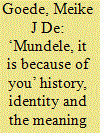

|
|
|
|
|
| Summary/Abstract |
Since the signing of the Sun City peace agreement in 2002, the Democratic Republic of Congo has strived to democratise with limited success. This paper explores some of the challenges of the process of democratisation in the Congo. It does so not by looking at democratisation policies and practices, but by focusing on identity construction and how these identities manifest themselves in Congolese engagements with the process of democratisation as a process that is pursued in partnership with Western donors. The paper traces the construction of an understanding of democracy as a means to make an end to perpetual victimisation of Congolese people due to foreign interference in the Congo. The paper argues that the concept of democracy has acquired over time a meaning that creates a highly ambivalent engagement with the current democratisation process, and in particular with Western donors of this process, which are simultaneously perceived as the main obstacles to its successful realisation.
|
|
|
|
|
|
|
|
|
|
|
|
|
|
|
|
| 2 |
ID:
127115
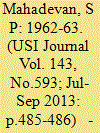

|
|
|
| 3 |
|
| 4 |
ID:
093811
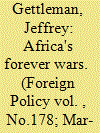

|
|
|
| 5 |
ID:
125281
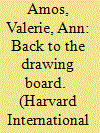

|
|
|
|
|
| Publication |
2013.
|
| Summary/Abstract |
Disasters are not only increasing in number, they are becoming more complex as natural and man-made crises combine to cause mega-disasters. Rapid urbanization, population growth, political unrest, and migration have created fragile environments in many countries, and boundaries are blurring between complex emergencies and chronic vulnerability in places such as the Democratic Republic of the Congo and Somalia. These factors have resulted in intense pressure on the UN's humanitarian organizations and partners to respond more quickly when disaster strikes and to be more effective in its response.
|
|
|
|
|
|
|
|
|
|
|
|
|
|
|
|
| 6 |
ID:
137252
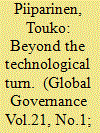

|
|
|
|
|
| Summary/Abstract |
In 2013 the United Nations applied two new peacekeeping instruments, the Intervention Brigade and unmanned aerial vehicles, in the Democratic Republic of Congo. This article argues that the significance and novelty of the Brigade and UAVs for UN peacekeeping are not only attributable to their technologically advanced and robust capacities, as maintained in previous accounts. Most importantly, these instruments also function as the harbingers of a new paradigm for peacekeeping—sovereignty building. The current technological turn of UN peacekeeping is only an epiphenomenon of a more profound paradigm shift in UN peacekeeping toward sovereignty building. Sovereignty building can be defined as an emerging set of peacekeeping practices that aims to create or reinforce four constitutive elements of sovereignty, which have previously been sidelined in state building; namely, sovereign agency (the political will of the host government), sovereign space (the area of supreme state authority), related sovereignty (the sovereignty network of subregional and regional peers), and popular sovereignty (the protection of the population).
|
|
|
|
|
|
|
|
|
|
|
|
|
|
|
|
| 7 |
ID:
115434
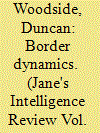

|
|
|
| 8 |
ID:
133463
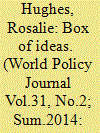

|
|
|
|
|
| Publication |
2014.
|
| Summary/Abstract |
CANKUZO PROVINCE, Burundi-Last November, Sedar Zamukulu Watula and 30 other Congolese refugees waited, perched on a circle of wobbly wooden benches in Kavumu Refugee Camp in western Burundi. Watula, 27, sweat in the heat, unusual for the rainy season. He was used to waiting-for food, for soap, for peace in his hometown of Goma in eastern Democratic Republic of Congo (DRC). But this time the wait was different. He'd come to hear a mzungu (white person) talk about a new project that was about to arrive in the camp-the Ideas Box
|
|
|
|
|
|
|
|
|
|
|
|
|
|
|
|
| 9 |
ID:
153604
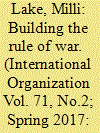

|
|
|
|
|
| Summary/Abstract |
Why have peace-building and reconstruction efforts so frequently failed to create durable institutions that can deter or withstand resurgent violence in volatile sites of cyclical conflict? Extant theory predicts that new institutions can help overcome violence and mitigate commitment problems in postconflict contexts by reducing uncertainty in inherently uncertain environments. By contrast, this article argues that postconflict institutions often prove limited in their abilities to contribute to durable peace because they offer wartime elites new venues in which to pursue conflict-era agendas. Through a micro-analysis of efforts to build the rule of law in eastern Democratic Republic of Congo, I demonstrate that wartime elites capture and instrumentalize new legal institutions to maximize their intra- and inter-organizational survival; to pursue economic, military, and political agendas behind the scenes; and, in some cases, to prepare for an imminent return to war.
|
|
|
|
|
|
|
|
|
|
|
|
|
|
|
|
| 10 |
ID:
097750
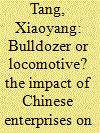

|
|
|
|
|
| Publication |
2010.
|
| Summary/Abstract |
This article is to analyze the impact of Chinese enterprises on the local employment practices in Angola and the Democratic Republic of the Congo (DRC). Based on surveys of over 100 Chinese and local companies and extensive interviews with managers and policy-makers in both countries made from July to December 2007, the study aims not only to depict the current employment practices of Chinese companies in Africa, but also to analyze the factors which affect the localization of employment. Two major patterns, bulldozer-type and locomotive-type, are identified and their implications for the local communities are discussed.
|
|
|
|
|
|
|
|
|
|
|
|
|
|
|
|
| 11 |
ID:
172579
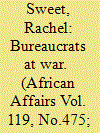

|
|
|
|
|
| Summary/Abstract |
Rebels often portray themselves as state-like to legitimize their rule, yet little is known about their on-the-ground relations with the administrators of state power—official bureaucrats. Drawing on internal armed group records from the Democratic Republic of Congo, this article argues that rebels’ state-like image is more than a simple veneer: Bureaucrats actively sustain state institutions and recruit rebel support during war. It develops a theory of the sources of leverage that bureaucrats use to negotiate with rebels. These interactions entail dual struggles to sustain the structures and symbols of state power and to shape the distribution of control over these institutions during war. On first front, bureaucrats can use their official status to market the symbols of state legitimacy—official certificates, codes, and paperwork—to rebels. On a second, to recruit protection for administrative posts. Pre-existing routines of noncompliance, like parallel taxes and sabotaged information, can use bureaucratic discretion and opacity to limit rebels’ takeover of state structures. This view from the ground demonstrates the real-time continuity of bureaucratic practice through daily paperwork and exchange during war. It contributes to research on rebel governance by illustrating new competitions for wartime statehood and illustrates the empirical practices of states seen as ‘juridical’ or weak.
|
|
|
|
|
|
|
|
|
|
|
|
|
|
|
|
| 12 |
ID:
108607
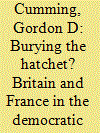

|
|
|
|
|
| Publication |
2011.
|
| Summary/Abstract |
Against the background of conflict in the Great Lakes Region, the UK and France promised, at their 1998 Saint-Malo summit, to set aside rivalries and cooperate on Africa. In subsequent Anglo-French gatherings, they singled out the DRC and pledged to work together there to promote peace and tackle poverty. This article asks whether this coordination took place and whether it involved a 'deconflictualisation' of approaches, 'coincidental' cooperation, or 'sustained and reciprocal' collaboration. It looks for evidence of institutionalisation of UK-French ties and policy cooperation in the fields of peacebuilding and poverty reduction. It then identifies the pressures for, and barriers to, collaboration, focusing particularly on the role of interests, foreign policy norms, institutional factors and resource constraints. It concludes by setting out the wider implications of UK-French cooperation and the limited prospects of closer future collaboration.
|
|
|
|
|
|
|
|
|
|
|
|
|
|
|
|
| 13 |
ID:
120047
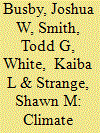

|
|
|
|
|
| Publication |
2013.
|
| Summary/Abstract |
Many experts argue that climate change will exacerbate the severity and number of extreme weather events. Such climate-related hazards will be important security concerns and sources of vulnerability in the future regardless of whether they contribute to conflict. This will be particularly true where these hazards put large numbers of people at risk of death, requiring the diversion of either domestic or foreign military assets to provide humanitarian relief. Vulnerability to extreme weather, however, is only partially a function of physical exposure. Poor, marginalized communities that lack access to infrastructure and services, that have minimal education and poor health care, and that exist in countries with poor governance are likely to be among the most vulnerable. Given its dependence on rainfed agriculture and its low adaptive capacity, Africa is thought to be among the most vulnerable continents to climate change. That vulnerability, however, is not uniformly distributed. Indicators of vulnerability within Africa include the historic incidence of climate-related hazards, population density, household and community resilience, and governance and political violence. Among the places in Africa most vulnerable to the security consequences of climate change are parts of the Democratic Republic of the Congo, Guinea, Sierra Leone, Somalia, and South Sudan.
|
|
|
|
|
|
|
|
|
|
|
|
|
|
|
|
| 14 |
ID:
116888
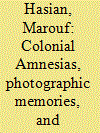

|
|
|
|
|
| Publication |
2012.
|
| Summary/Abstract |
This article provides readers with a biopolitical critique of the recent debates that have swirled around the renovations at the Royal Museum for Central Africa (rmca) and the 'Memory of Congo' exhibits. The author argues that the rmca has become a contested site of memory, where some older photographs that were once used in Congo Reform Movements have been reappropriated in (post)colonial disputes about the epistemic and demographic features of what Adam Hochschild has called the forgotten Congolese 'holocaust'.
|
|
|
|
|
|
|
|
|
|
|
|
|
|
|
|
| 15 |
ID:
098082
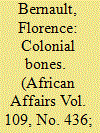

|
|
|
|
|
| Publication |
2010.
|
| Summary/Abstract |
The Franco-Congolese agreement to enshrine the corpse of Pierre Savorgnan de Brazza in a grand memorial tomb in Brazzaville (2006) has been decried by many observers as neo-colonial farce. This article interprets France's agenda to propose a 'suave reconquest' of its former colonies, and Sassou Nguesso's forceful mobilization of national and regional support. Beyond the immediate political significance of the episode, however, the article proposes new ideas on the ways in which modern states, North and South, depend on 'tournaments of value' that assign polarized worth to persons, and often back up international deals with transactions in sanctified human remains. The tactic, forged in part during the colonial era, illuminates important aspects of today's global imaginaries of domination. Brazza's bones work, in France and Africa, as a carnal fetish that, borrowing form various philosophies of power, merges Western and African beliefs in the body politic.
|
|
|
|
|
|
|
|
|
|
|
|
|
|
|
|
| 16 |
ID:
108027
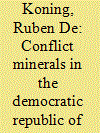

|
|
|
|
|
| Publication |
Stockholm, SIPRI, 2011.
|
| Description |
vi, 42p.
|
| Series |
SIPRI policy paper 27 June 2011
|
| Standard Number |
9789185114641
|
|
|
|
|
|
|
|
|
|
|
|
Copies: C:1/I:0,R:0,Q:0
Circulation
| Accession# | Call# | Current Location | Status | Policy | Location |
| 056279 | 338.2096751/KON 056279 | Main | On Shelf | General | |
|
|
|
|
| 17 |
ID:
164846
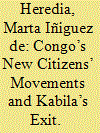

|
|
|
|
|
| Summary/Abstract |
The strategies Kabila adopted to avoid stepping down at the end of his term in December 2016 inadvertently consolidated this new democratic wave.”
|
|
|
|
|
|
|
|
|
|
|
|
|
|
|
|
| 18 |
ID:
157422
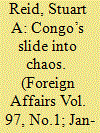

|
|
|
|
|
| Summary/Abstract |
On January 16, 2001, the Democratic Republic of the Congo tumbled into uncertainty. The country’s president, Laurent Kabila, had been sitting in his office at his marble palace in Kinshasa, the capital, when one of his teenage bodyguards entered, drew his pistol, aimed it at Kabila, and fired several times.
|
|
|
|
|
|
|
|
|
|
|
|
|
|
|
|
| 19 |
ID:
088476
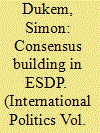

|
|
|
|
|
| Publication |
2009.
|
| Summary/Abstract |
This paper examines how EU Member States reach agreement in the area of European Security and Defence Policy, including how differences are resolved and priorities aligned. The case study, Operation Artemis conducted in the Democratic Republic of the Congo in 2003, is used to test the key explanatory hypotheses of normative institutionalism. It is argued that normative entrapment played a significant role, although the cooperative bargaining aspects were significantly modified in this case by the awareness that one larger EU Member State was willing to assume the bulk of the burdens.
|
|
|
|
|
|
|
|
|
|
|
|
|
|
|
|
| 20 |
ID:
077655
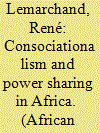

|
|
|
|
|
| Publication |
2007.
|
| Summary/Abstract |
Although there are obvious merits to the consociational argument, including the need to recognize the claims of minorities through power-sharing arrangements, translating theory into practice has generally failed in much of Africa. The reasons for this are many and are by no means reducible to single-factor explanations. Looking at the recent experiments in power sharing in former Belgian Africa, this article offers a comparative assessment of the radically different trajectories followed by Rwanda, Burundi, and the Democratic Republic of the Congo (DRC) in their efforts to regulate conflict through consociational formulas. Although Rwanda stands as a textbook example of failed power sharing, and the DRC as a less than successful experiment, Burundi, which comes nearest to institutionalizing the Lijphart model, offers grounds for cautious optimism about the merits of a consociational polity. On the strength of the evidence from Burundi, one might conceivably argue that the key to success lies in the extent to which the technicalities of power sharing tend to approximate the conditions spelled out by Lijphart, notably group autonomy, proportionality, and the minority veto. Closer scrutiny of the cases at hand suggests a somewhat different conclusion. Perhaps even more importantly than the mechanics of power sharing, the socio-political context is what spells the difference between success and failure
|
|
|
|
|
|
|
|
|
|
|
|
|
|
|
|
|
|
|
|
|